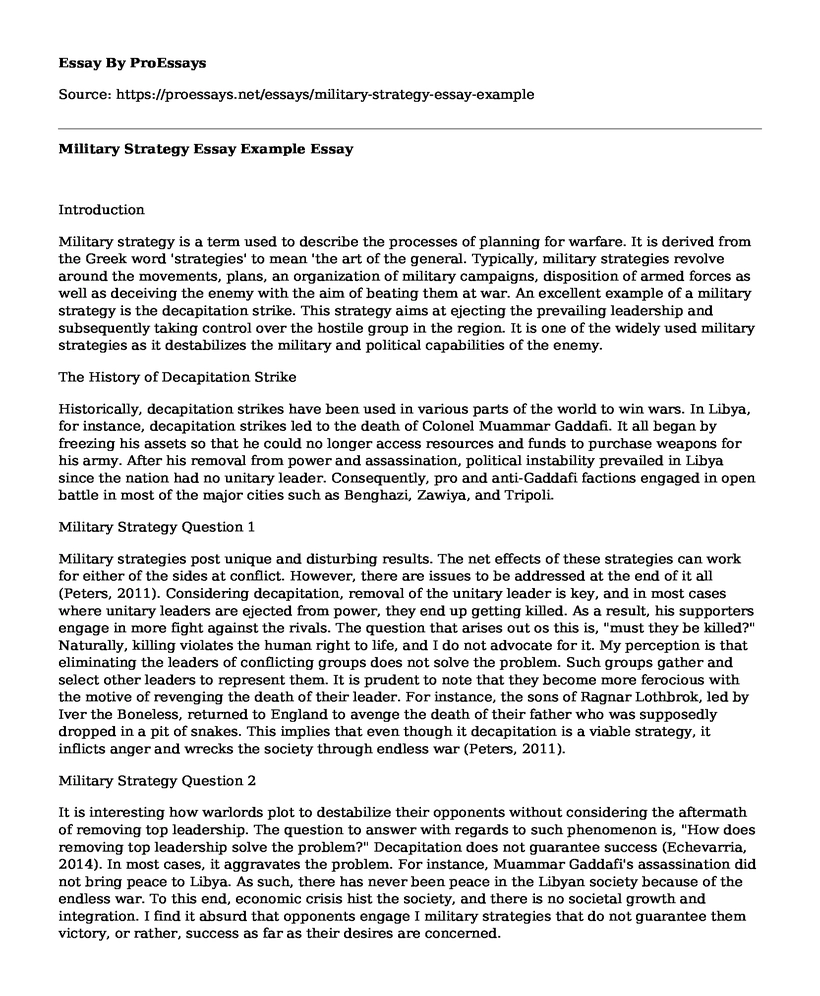Introduction
Military strategy is a term used to describe the processes of planning for warfare. It is derived from the Greek word 'strategies' to mean 'the art of the general. Typically, military strategies revolve around the movements, plans, an organization of military campaigns, disposition of armed forces as well as deceiving the enemy with the aim of beating them at war. An excellent example of a military strategy is the decapitation strike. This strategy aims at ejecting the prevailing leadership and subsequently taking control over the hostile group in the region. It is one of the widely used military strategies as it destabilizes the military and political capabilities of the enemy.
The History of Decapitation Strike
Historically, decapitation strikes have been used in various parts of the world to win wars. In Libya, for instance, decapitation strikes led to the death of Colonel Muammar Gaddafi. It all began by freezing his assets so that he could no longer access resources and funds to purchase weapons for his army. After his removal from power and assassination, political instability prevailed in Libya since the nation had no unitary leader. Consequently, pro and anti-Gaddafi factions engaged in open battle in most of the major cities such as Benghazi, Zawiya, and Tripoli.
Military Strategy Question 1
Military strategies post unique and disturbing results. The net effects of these strategies can work for either of the sides at conflict. However, there are issues to be addressed at the end of it all (Peters, 2011). Considering decapitation, removal of the unitary leader is key, and in most cases where unitary leaders are ejected from power, they end up getting killed. As a result, his supporters engage in more fight against the rivals. The question that arises out os this is, "must they be killed?" Naturally, killing violates the human right to life, and I do not advocate for it. My perception is that eliminating the leaders of conflicting groups does not solve the problem. Such groups gather and select other leaders to represent them. It is prudent to note that they become more ferocious with the motive of revenging the death of their leader. For instance, the sons of Ragnar Lothbrok, led by Iver the Boneless, returned to England to avenge the death of their father who was supposedly dropped in a pit of snakes. This implies that even though it decapitation is a viable strategy, it inflicts anger and wrecks the society through endless war (Peters, 2011).
Military Strategy Question 2
It is interesting how warlords plot to destabilize their opponents without considering the aftermath of removing top leadership. The question to answer with regards to such phenomenon is, "How does removing top leadership solve the problem?" Decapitation does not guarantee success (Echevarria, 2014). In most cases, it aggravates the problem. For instance, Muammar Gaddafi's assassination did not bring peace to Libya. As such, there has never been peace in the Libyan society because of the endless war. To this end, economic crisis hist the society, and there is no societal growth and integration. I find it absurd that opponents engage I military strategies that do not guarantee them victory, or rather, success as far as their desires are concerned.
Conclusion
War is a fundamental component of man's history, and over the years, different warlords and conflicting factions have used various war strategies against each other. However, some of these strategies work in their favor while others do not guarantee them success. Nonetheless, these strategies have enormous impacts on society. For instance, decapitation is a strategy that targets the top leadership. Removing such individual from power aggravates anger among their subjects, and this for them to seek revenge. As such, the war continues, and the society is significantly destroyed.
References
Echevarria, A. J. I. I. (2014). Reconsidering the American way of war: US military practice from the Revolution to Afghanistan. Washington: Georgetown University Press.
Peters, R. (2011). Endless War: Middle-Eastern Islam vs. Western civilization. Mechanicsburg, PA: Stackpole Books.
Cite this page
Military Strategy Essay Example. (2022, Nov 04). Retrieved from https://proessays.net/essays/military-strategy-essay-example
If you are the original author of this essay and no longer wish to have it published on the ProEssays website, please click below to request its removal:
- Paper Example on Lift Force: How Planes Fly
- Gen. John "Jay" Raymond Speech Outline
- Peer Reviewed Article: Health Care Issues for Veterans
- Essay Sample on Innovation and the Public Manager
- Interview with Mr. John Smith: An 83-Year-Old Retired Veteran from Missouri
- Essay Example on Dances With Wolves: A Journey of Love and Mutual Respect
- Essay Sample on Veterans' Combat & Homecoming: Belonging in a Divided Society







